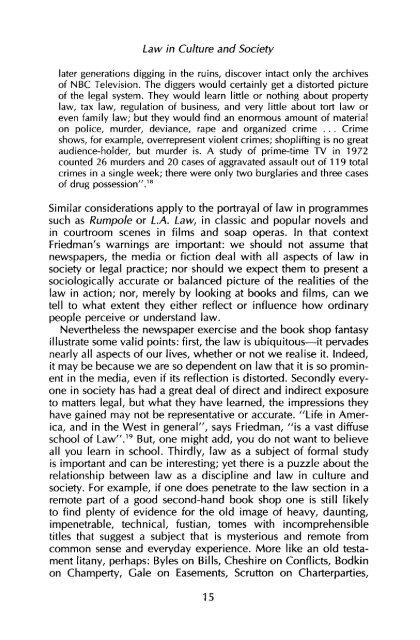Blackstone's Tower: The English Law School - College of Social ...
Blackstone's Tower: The English Law School - College of Social ...
Blackstone's Tower: The English Law School - College of Social ...
Create successful ePaper yourself
Turn your PDF publications into a flip-book with our unique Google optimized e-Paper software.
<strong>Law</strong> in Culture and Society<br />
later generations digging in the ruins, discover intact only the archives<br />
<strong>of</strong> NBC Television. <strong>The</strong> diggers would certainly get a distorted picture<br />
<strong>of</strong> the legal system. <strong>The</strong>y would learn little or nothing about property<br />
law, tax law, regulation <strong>of</strong> business, and very little about tort law or<br />
even family law; but they would find an enormous amount <strong>of</strong> material<br />
on police, murder, deviance, rape and organized crime . . . Crime<br />
shows, for example, overrepresent violent crimes; shoplifting is no great<br />
audience-holder, but murder is. A study <strong>of</strong> prime-time TV in 1972<br />
counted 26 murders and 20 cases <strong>of</strong> aggravated assault out <strong>of</strong> 119 total<br />
crimes in a single week; there were only two burglaries and three cases<br />
<strong>of</strong> drug possession". 18<br />
Similar considerations apply to the portrayal <strong>of</strong> law in programmes<br />
such as Rumpole or LA <strong>Law</strong>, in classic and popular novels and<br />
in courtroom scenes in films and soap operas. In that context<br />
Friedman's warnings are important: we should not assume that<br />
newspapers, the media or fiction deal with all aspects <strong>of</strong> law in<br />
society or legal practice; nor should we expect them to present a<br />
sociologically accurate or balanced picture <strong>of</strong> the realities <strong>of</strong> the<br />
law in action; nor, merely by looking at books and films, can we<br />
tell to what extent they either reflect or influence how ordinary<br />
people perceive or understand law.<br />
Nevertheless the newspaper exercise and the book shop fantasy<br />
illustrate some valid points: first, the law is ubiquitous—it pervades<br />
nearly all aspects <strong>of</strong> our lives, whether or not we realise it. Indeed,<br />
it may be because we are so dependent on law that it is so prominent<br />
in the media, even if its reflection is distorted. Secondly everyone<br />
in society has had a great deal <strong>of</strong> direct and indirect exposure<br />
to matters legal, but what they have learned, the impressions they<br />
have gained may not be representative or accurate. "Life in America,<br />
and in the West in general", says Friedman, "is a vast diffuse<br />
school <strong>of</strong> <strong>Law</strong>". 19 But, one might add, you do not want to believe<br />
all you learn in school. Thirdly, law as a subject <strong>of</strong> formal study<br />
is important and can be interesting; yet there is a puzzle about the<br />
relationship between law as a discipline and law in culture and<br />
society. For example, if one does penetrate to the law section in a<br />
remote part <strong>of</strong> a good second-hand book shop one is still likely<br />
to find plenty <strong>of</strong> evidence for the old image <strong>of</strong> heavy, daunting,<br />
impenetrable, technical, fustian, tomes with incomprehensible<br />
titles that suggest a subject that is mysterious and remote from<br />
common sense and everyday experience. More like an old testament<br />
litany, perhaps: Byles on Bills, Cheshire on Conflicts, Bodkin<br />
on Champerty, Gale on Easements, Scrutton on Charterparties,<br />
15

















